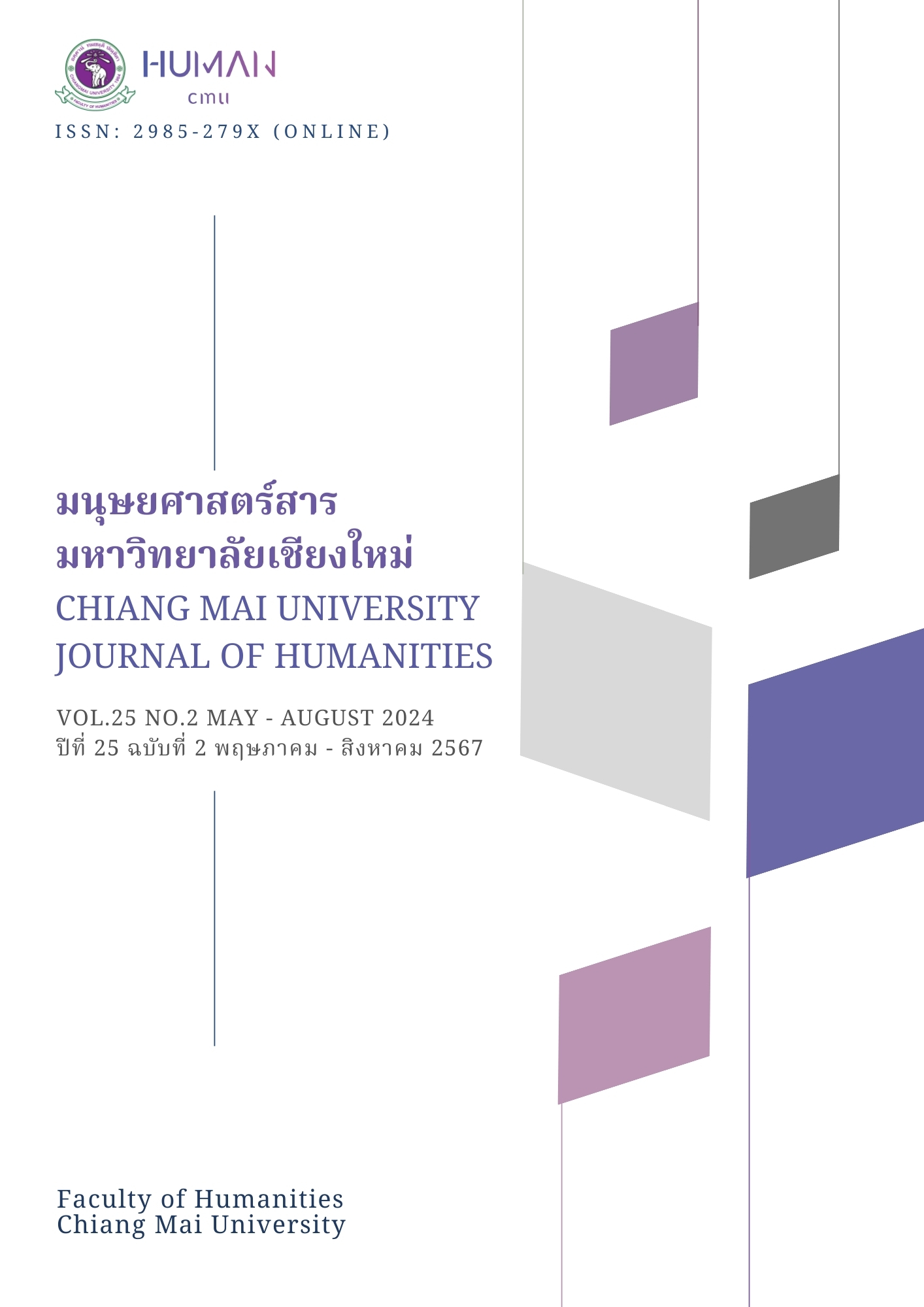สตรี เทพนิยาย ตำนาน และเรื่องเล่าในศาสนาพุทธกับปรัชญาเต๋า ตามกระบวนทัศน์สตรีนิยมเชิงนิเวศ
Main Article Content
บทคัดย่อ
บทความนี้มุ่งวิเคราะห์แนวคิดเชิงนิเวศ เรื่องราวเกี่ยวกับสตรีในเทพนิยาย ตำนานและเรื่องเล่าในพุทธศาสนาและปรัชญาลัทธิเต๋าตามกระบวนทัศน์สตรีนิยมเชิงนิเวศ เพื่อให้ผู้คนได้ตระหนักถึงการอยู่ร่วมกันอย่างสมานฉันท์ระหว่างมนุษย์กับสิ่งแวดล้อมเชิงนิเวศ เรื่องราวในเทพนิยาย ตำนานและเรื่องเล่าของสองศาสนาล้วนสะท้อนให้เห็นการหลอมรวมเป็นหนึ่งระหว่างมนุษย์กับธรรมชาติ โดยเฉพาะการเชิดชูบทบาทของผู้หญิงที่เป็นผู้ให้กำเนิดสรรพชีวิตเช่นเดียวกับผืนแผ่นดินในธรรมชาติที่ให้กำเนิดสรรพสิ่ง เป็นการยืนยันว่าทั้งผู้หญิงและธรรมชาติเป็นหนึ่งเดียวกัน แนวคิดดังกล่าวควรค่าแก่การนำมาปรับประยุกต์ใช้เพื่อแก้ไขวาทกรรมชายเป็นใหญ่ที่ยึด “มนุษย์” เป็นศูนย์กลางจักรวาล และสร้างสรรค์สังคมโลกให้งดงามน่าอยู่ยิ่งขึ้น
Article Details

อนุญาตภายใต้เงื่อนไข Creative Commons Attribution-NonCommercial-NoDerivatives 4.0 International License.
เอกสารอ้างอิง
กุลวรา งามเอกเอื้อ. (2563). การผลิตซ้ำความงามของนางแก้วหน้าม้า. วารสารสหวิทยาการ, 11(2), 35-51.
ดุษฎี ปัญญา. (2564). ปู่สังกะสา ร่องรอยผู้หญิงเป็นใหญ่ในตำนานไท-ลาว. นิตยสารทางอีสาน, 10 (107), 34-38.
ตรีศิลป์ บุญขจร. (2561). นิเวศสำนึกกับวรรณคดีศึกษา. http://pioneer.chula.ac.th/~btrislp/litenvir
Content/1_on/ecoconsci/Ecoconsci.htm
ธัญญา สังขพันธานนท์. (2556). ผู้หญิงยิงเรือ สตรีนิยมเชิงนิเวศในวรรณคดีไทย.นาคร
ธัญญา สังขพันธานนท์. (2558). แว่นวรรณคดี ทฤษฎีร่วมสมัย. นาคร.
นฤมล มารคแมน. (2560). อิทธิปาฏิหาริย์ของพระพุทธเจ้า. วารสารรามคำแหง ฉบับมนุษยศาสตร์, 36(2), 157-172.
นุชารัตน์ มุงคุณ และอรทัย เพียยุระ (2564). ผู้หญิงกับธรรมชาติในนวนิยายไทยร่วมสมัย มุมมองสตรีนิยมเชิงนิเวศ. วารสารสังคมศาสตร์และมานุษยวิทยาเชิงพุทธ, 6(2), 275–288.
พีรพัฒน์ พันศิริ และเกศินี ประทุมสุวรรณ. (2563). มรดกภูมิปัญญาทางวัฒนธรรมเรื่องพิธีกรรมและบททำขวัญข้าวในจังหวัดนครปฐม. วารสารสังคมศาสตร์และมานุษยวิทยาเชิงพุทธ, 5 (5), 346-362.
รื่นฤทัย สัจจพันธ์. (2534). ตัวละครหญิงในวรรณคดีไทยสมัยอยุธยาและรัตนโกสินทร์ตอนต้น(1893-2394) (วิทยานิพนธ์ปริญญาดุษฎีบัณฑิต, จุฬาลงกรณ์มหาวิทยาลัย). https://www.arts.chula.ac.th
/thai/thaiarchives/index.php/2021/10/04/1516/
วิฑูรย์ คุ้มหอม. (2558). แม่โพสพ ตำนาน ความเชื่อและพิธีรกรรม บนวิถีชีวิตที่เปลี่ยนแปลงของชาวนาเมืองเพชรบุรี. วารสารวิชาการมนุษย์ศาสตร์และสังคมศาสตร์, 3 (2), 140-151.
เสถียร พันธรังษี. (2563). ศาสนาเปรียบเทียบ.ศรีปัญญา.
สุธาวัลย์ เสถียรไทย. (2563). การพัฒนาที่ยั่งยืนแนวพุทธ กับเศรษฐกิจสีเขียว.สถาบันธรรมรัฐเพื่อการพัฒนสังคมและสิ่งแวดล้อม
อรรถ ดีที่สุด. (2563). แม่กับธรรมชาติในวรรณกรรมยุคโลกาภิวัตน์ มุมมองสตรีนิยมเชิงนิเวศ. วารสาร อักษราพิบูล, 1(02), 8-25
Buckingham, S. (2004). Ecofeminism in the twenty‐first century. Geographical journal, 170(2), 146-154.
Devine, M. (1992). Woman and nature: literary reconceptualization. The Scarecrow Press.
Du, H. (2016). The unity of heaven and man ideology and the construction of ecological civilization [Tian ren he yi yu shengtai wenming jianshe]. Culture Journal, 2016(08), 159-161.
Fan, R.Y. (2022). From the male-centered perspective of ecofeminism on the “Field of Life and Death”[Cong shengtai zhuyi de nanxing zhongxin shijiao juelun]. Qinzhi 12(2022), 121-123. Doi:CNKI:SUN:QINZ.0.2022-12-038.
Ge, G.L. (11 November, 2003). Comparison of neidan and monasticism [Neidan yu xiudao de bijiao]. Proceeding of the Second Conference of the Symposium on Taoist Thought and China’s Social Development and Progress.
Jiang, L.L. (2023). On the construction of Zhuangzi's philosophy of life [Lun Zhuangzi rensheng de jiangou]. Ancient Culture and Creativity, 2023(05), 52-54. DOI:10.20024/j.cnki.
Leach, M. (2007). Earth mother myths and other ecofeminist fables: How a strategic notion rose and fell. Development and change, 38(1), 67-85.
Li, J. (2014). The reconstruction of the relationship between man and nature in the second wave of ecological literary criticism [Di er po shengtai wenxue piping zhong ren yu ziran guanxi de chongou]. Academia, 2014(10), 156-164.
Li, R.Y. (2022). “Hong Gaoliang Family” in the perspective of ecofeminism [Shengtai nvxing zhuyi shiye xia de “Hong Gaoliang Jiazhu”]. Jinguwenshuang, 26(2022), 4-6. doi:10.20024/j.cnki.CN42-1911/I.2022.26.001.
Li, Z. (2023). The philosophical basis classical meaning and modern value of the concept of “uniting human and universe [ Tianren heyi guannian de zexue jichu, gudian yihan yu xiandai jiazhi]. History of Chinese Philosophy. 2023 (06), 12-18.
Luo, T. (2004). A pluralistic model of western feminist literary criticism [Xifang nvxing zhuyi wenxue piing de douoyuan moshi]. Beijing: China Social Sciences Press.
Ma, J.J. (2022). A comparative study on the traditional culture between the Dai people in Yunnan Province of China and the Thai people in central Thailand [Zhongguo Yuannan Daizu yu Taiguo zhongbu Taizu chuantong wenhua bijiao yanjiu]. West Leather, 2022(12), 31-34.
Merchant, C. (2006). The scientific revolution and the death of nature. Isis, 97(3), 513-533.
Qiao, Q.J. (2023). The historical significance and contemporary development of the unity of heaven and man [Tianren heyi de lishi yiyi yu dangdai fazhan]. Office Administration, 2023(03),77-80.
Sun, Y.C. (2008). The one of heaven and man: the cultural meaning of harmoney between man and nature [Tianren heyi: ren yu dazhiran hexie de wenhua yihan]. Journal of Southeast University, 2008(3), 34-37.
Warren, Karen J. (1997). Ecofeminism: women, culture, nature. Indiana University Press.
Warren, K. J. (2018). Taking empirical data seriously: An ecofeminist philosophical perspective. In Living with Contradictions (pp. 640-650). Routledge.
Wang, Q.Q. (2022) On the epidemic writing of thelLegend of the white snake and its inspiration to the current epidemic literature [Qiantan “Baishezhuan” de yiqing xiezuo he qi dui dangxia yiqing wenxue de qishi]. Education & Social Sciences, 2022(01). 29-32
Wu, L.L.(2018). Study on cultural memory of the myths of the origin of tice in China and Thai [Zhong Tai shuidao qiyuan Shenhua d wenhua yanjiu]. Doctoral Dissertations. Master Dissertation of Faculty of Arts, East China Normal University.
Wu, X.D. (2022). Analysis on the name of the residence of the queen mother of the west [Xiwangmu juzhu mingcheng jiexi]. Chinese Literature, 2022(04), 109-114.
Xu, K. (2013). The classic of mountains and seas [Shan haijing]. Shanxi Normal University Press.
Zhang, S.H. (2013). Lao Zi - Translation and analysis [ Laozi yizhu yu jiexi]. Beijing: Yuelu Books Press.
Zhang, X.Q. (2006). On the connotation and characteristics of ecological literature [Lun shengtai wenxue de neihan yu tedian]. Journal of Jiangsu Normal University Philosophy and Sciences Edition, 32(6). 4.
Zhang, S. & Zhao, P. (2012). Taoist ideology of "The Unity of Heaven and Man" and eeological civilization [Daojiao de tianren heyi sixiang yu shengtai wenming jianshe]. Social Science Research, 2012(05),170-173.


